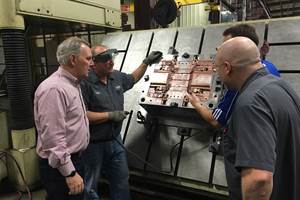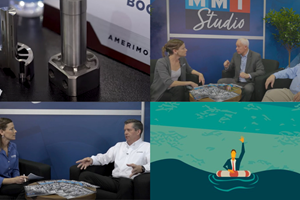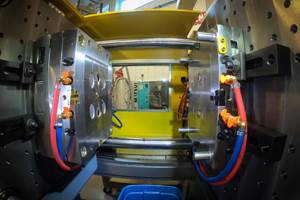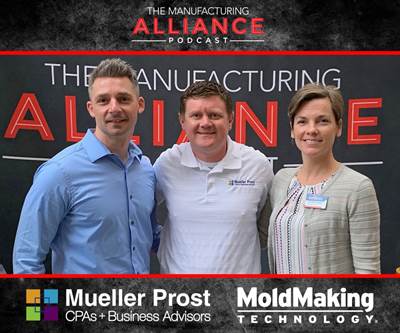
Here is an overview of the tax relief provided most relevant to mold shops.
Families First Coronavirus Response Act
On March 13, 2020, President Trump signed the Families First Coronavirus Response Act (FFCRA), enacting emergency paid sick leave for employees unable to work due to diagnosis, preventative care, or quarantine as a result of the coronavirus, and a tax credit to the employer required to pay such wages. Employers are required to provide 80 hours of qualified paid sick leave or qualified paid family leave to employees affected by COVID-19.
Qualified sick leave includes both self-care and family leave. Self-care leave must be paid at the employee’s regular rate of pay and not less than the minimum wage, capped at $511 per day ($5,110 in aggregate); and family leave must be paid at two-thirds of the employee’s regular rate of pay, capped at $200 per day ($2,000 in aggregate).
Mold shops can take a payroll tax credit equal to 100% of the qualified wages against the employer’s portion of social security and Medicare taxes. The amount of the credit is increased by the portion of the employer’s qualified health plan expenses that are allocable to the qualified sick leave wages.
COVID-19 Emergency Declaration
The same day that FFCRA was signed into law, the President declared an emergency under the Stafford Disaster Relief and Emergency Assistance Act. This declaration enacted IRC §165(i), which holds that shops that have experienced financial hardship due to identifiable extraordinary events have the option of accelerating certain losses related to the disaster to the tax year immediately preceding the tax year in which the financial loss was experienced. That is, losses that occurred because of COVID-19 in 2020 may be used to offset taxable income in 2019.
These losses may include, but are not limited to:
- Prepaid raw materials, supplies, or inventory used to fulfill a contract or P.O. that has been canceled.
- Prepaid events, travel, conference space, hotel rooms, etc. if not refunded or provided a credit.
- Abandonment of leasehold or tenant improvements.
Shops must elect to apply this provision, and the election must be made on an originally filed or amended return filed on or before six months after the original due date (including extensions) of the tax return for the year in which the disaster occurred. For example, a calendar-year C Corporation that wishes to amend its 2019 return to take the 2020 COVID-19 losses, has until April of 2022 to amend the 2019 return to make the §165(i) election take the loss (the 2020 extended due date is October 15, 2021, plus six months = April 15, 2022).
Mold shops should carefully consider how these changes apply to their operations and assets to determine whether action would be beneficial.
Coronavirus Aid, Relief and Economic Security (CARES) Act
President Trump signed the CARES Act on March 27, 2020, the most significant relief package ever passed by the U.S. Congress. The CARES Act made several changes to the tax code that are favorable to mold shops.
The Employee Retention Tax Credit provides for a refundable payroll tax credit equal to 50% of the qualified wages paid by mold shop that had to shut down as a result of government order or who experienced a greater than 50% reduction of quarterly receipts measured on a year-over-year basis.
Mold shops may also defer payment of the employer share of Social Security tax (FICA at 6.2%) for payroll tax deposits required to be made between March 27, 2020, and December 31, 2020. The amounts otherwise due during this period will be due in two installments—the first on December 31, 2021, with the remainder due on December 31, 2022. The CARES Act only allowed for shops that did not receive loan forgiveness under the Paycheck Protection Program (PPP) to benefit from the payroll tax deferral. However, the Paycheck Protection Programs Flexibility Act of 2020, enacted on June 5, 2020, allows mold shops to receive the payroll tax deferral even if the shop receives loan forgiveness under the PPP.
The CARES Act also provided a much-needed technical correction from the Tax Cuts and Jobs Act of 2017 (TCJA). As we discussed in June, the CARES Act provided a technical correction to the TCJA that specifically identifies Qualified Improvement Property (QIP) as 15-year property for tax depreciation purposes, making the asset eligible for bonus depreciation and 100% write-off in the tax year placed in service. These rules apply to assets placed in service in 2018 and thereafter. Mold shops can change their accounting method, and “catch-up” missed depreciation.
The CARES Act also modified the interest expense limitation rules for larger mold shops (those with average annual gross receipts exceeding $26 million). Shops subject to this limitation receive relief in tax years beginning in 2019 and 2020 by increasing the interest expense limitation to 50% of adjusted taxable income (as opposed to 30% of adjusted taxable income, as imposed by the TCJA).
Also, for any losses generated in any tax year beginning after December 31, 2017, and before January 1, 2021, shops may offset 100% of the taxable income to which the loss is carried (the TCJA had originally enacted an 80% limitation). The 80% of taxable income limitation is reinstated for the tax year beginning after December 31, 2020. For flow-through entities (S Corporations and Partnerships), the excess loss limitation, which limited that amount of loss a shop can claim in a tax year, has been delayed until the tax year 2021.
Mold shops looking for cash while weathering the results of the coronavirus should consider whether the tax code can help.
Partnership Relief
On April 8, 2020, the IRS granted partnership filing relief for shops that may want to amend their prior-year Form 1065 by issuing Revenue Procedure 2020-23. While many mold shop operations are an entity taxed as a corporation (C or S Corporation), many shop owners own their building and plant in a separate entity, typically an LLC that is being taxed as a partnership. Any partnership whose partners include certain trusts disregarding entities, or other partnerships is unable to elect out of the centralized partnership audit regime. As such, they can’t amend their partnership returns, but must instead file an Administrative Adjustment Request (AAR) to report any changes, which get reflected on the shop’s tax return in the year in which the AAR is filed.
Partnerships that have already filed their returns may amend their 2018 and/or 2019 partnership tax returns to take advantage of the CARES Act provisions, including elections made or not made on the originally filed 2018 or 2019 tax returns. Mold shops with the following facts may want to evaluate whether it's appropriate to amend their tax returns:
- The shop placed Qualified Improvement Property into service in the tax year 2018 or thereafter.
- The shop is eligible for and has not claimed the R&D tax credit.
- The shop is eligible for and has not claimed the Section 199A deduction.
- The shop wants to change its election concerning the interest expense limitation or bonus depreciation.
This relief is time-sensitive. Partnerships have until September 30, 2020, to take advantage of the notice allowing for partnerships to amend their Form 1065. Any changes made to partnerships subject to the centralized partnership audit regime made after September 30, 2020, will impact the year the AAR is filed.
No Deduction for Expense Paid with Forgiven PPP Funds
On Thursday, April 30, 2020, the IRS issued Notice 2020-32, the contents of which surprised many in the tax community and members of Congress alike. While the CARES Act states that amounts of forgiveness under the PPP shall be excluded from income, the Treasury determined that shops would not be allowed a deduction for the payroll costs, mortgage interest, rent payment, or utilities that were paid using the funds forgiven by the PPP.
Numerous changes have been made to our tax laws, as well as the procedures mold shops must follow for compliance. Mold shops should carefully consider how these changes apply to their operations and assets to determine whether action would be beneficial. Mold shops looking for cash while weathering the results of the coronavirus should consider whether the tax code can help.
Related Content
OEE Monitoring System Addresses Root Cause of Machine Downtime
Unique sensor and patent-pending algorithm of the Amper machine analytics system measures current draw to quickly and inexpensively inform manufacturers which machines are down and why.
Read MoreFrom Injection Mold Venting to Runnerless Micro Molds: MMT's Top-Viewed June Content
The MoldMaking Technology team has compiled a list of the top-viewed June content based on analytics. This month, we covered an array of topics including injection mold venting, business strategies and runnerless micro molds. Take a look at what you might have missed!
Read MoreWomen Impacting Moldmaking
Honoring female makers, innovators and leaders who are influencing our industry's future.
Read MorePredictive Manufacturing Moves Mold Builder into Advanced Medical Component Manufacturing
From a hot rod hobby, medical molds and shop performance to technology extremes, key relationships and a growth strategy, it’s obvious details matter at Eden Tool.
Read MoreRead Next
PODCAST: Interview with Our Tax Guy, Mike Devereux
MMT Editorial Director Christina Fuges sat down with The Manufacturing Alliance Podcast for a lively conversation with Mike Devereux of Mueller Prost who brings tax knowledge and expertise to the brand’s monthly The Bottom Line column.
Read MoreTax Reform for Mold Builders: 30 Months After Enactment
A review of the impact the Tax Cuts and Jobs Act of 2017 has had on mold builders over the past two years.
Read MoreHow to Use Strategic Planning Tools, Data to Manage the Human Side of Business
Q&A with Marion Wells, MMT EAB member and founder of Human Asset Management.
Read More







.jpg;maxWidth=300;quality=90)





















